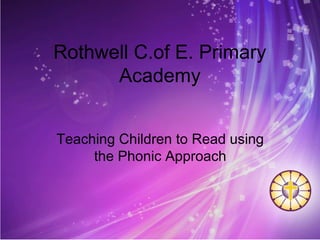
Teaching Children to Read using the Phonic Approach
- 1. Rothwell C.of E. Primary Academy Teaching Children to Read using the Phonic Approach
- 2. . Why Phonics? •Research shows that when phonics is taught in a structured way – starting with the easiest sounds and progressing through to the most complex – it is the most effective way of teaching young children to read. It is particularly helpful for children aged 5 to 7. •Almost all children who receive good teaching of phonics will learn the skills they need to tackle new words. They can then go on to read any kind of text fluently and confidently, and to read for enjoyment. •Children who have been taught phonics also tend to read more accurately than those taught using other methods, such as ‘look and say’. This includes children who find learning learning to read difficult, including those with Dyslexia. DfE 2013
- 3. What is Phonics? Words are made up from small units of sound called phonemes. Phonics teaches children to be able to listen carefully and identify the phonemes that make up each word. This helps children to learn to read words and to spell words. There are 44 phonemes in English. We teach children to articulate the phonemes using the pure sound e.g. ‘sss’ not ‘suh’.
- 6. How many phonemes in these words? egg mat boat sheep church
- 7. Phase Phonic Knowledge and skills Phase 1 (nursery) Activities are divided into seven aspects, including environmental sounds, instrumental sounds, body sounds, rhythm and rhyme, alliteration, voice sounds and finally oral blending and segmenting. Phase 2 (Reception) Up to 6 weeks Learning 19 letters of the alphabet and one sound for each. Blending sounds together to make words. Segmenting words into their separate sounds. Beginning to read simple captions. Phase 3 (Reception) Up to 12 weeks The remaining 7 letters of the alphabet, one sound for each. Graphemes such as ch, oo, th representing the remaining phonemes not covered by single letters. Reading captions, sentences and questions. On completion of this phase, children will have learnt the "simple code", i.e. one grapheme for each phoneme in the English language. Phase 4 (Reception) 4 to 6 weeks No new grapheme-phoneme correspondences are taught in this phase. Children learn to blend and segment longer words with adjacent consonants e.g. jump, swim, clap. Phase 5 (Year 1) Now we move on to the "complex code". Children learn more graphemes for the phonemes which they already know, plus different ways of pronouncing the graphemes they already know. Phase 6 (Year 2 and beyond) Working on spelling, including prefixes and suffixes, doubling and dropping letters etc. Letters and Sounds is taught in 6 overlapping phases, outlined in the table below:-
- 8. Teaching tricky words • Tricky words (camera words) are the those words which cannot be sounded out correctly using the Jolly Phonics sounds. The only way these words can be read and spelt correctly is by learning them and having plenty of practice. said go my the was
- 9. How do we know when children are ready to learn to read? Book Awareness •Holds books the correct way up and turns pages. •Handles books carefully. •Chooses to select and ‘read’ books independently. Awareness of Print •Knows that print conveys meaning. •Knows that, in English, print is read from left to right and top to bottom. •Understands the concept of a word. •Recognises own name. •Recognises some familiar words. Story Language •Suggests how a story might end. •Listens to stories with increasing attention and recall.
- 10. Phonological Awareness •Shows an awareness of alliteration e.g. can hear when two or more objects begin with the same sound. •Recognises when two or more words rhyme. •Hears and says the initial sound in words. •Links some sounds to letters ( approximately 12) •Blends cvc words e.g. knows that c-a-t says cat.
- 11. Shared Reading The children share an enlarged text with the teacher. The text is usually slightly above the children’s reading level. The teacher models reading by pointing out punctuation, key vocabulary etc.
- 12. Individual Reading In Reception, initially, we listen to each child read individually. This is an opportunity to discuss the child’s ‘Home Reader’, check children’s progress in learning high frequency words and phonemes or share a book of the child’s choice.
- 13. Home Reading Books When the children reach a readiness for reading stage, your children will bring home a Home Reading Book to share with your child. This may be a scheme book or a ‘real’ book. You will also have a reading diary to record any reading you have done with your child.
- 14. The Early Learning Goal for Reading By the end of the Foundation Stage most children should:- Read and understand simple sentences. Use phonic knowledge to decode regular words and read them aloud accurately. They also read some common irregular words (tricky words). They demonstrate understanding when talking with others about what they have read.
Notas del editor
- There are approximately 44 phonemes in english (regional dialects) Play annunciation clip
- Remember we’re not counting the letters (graphemes) Play video clip of oral blending
- Demonstrate how we take a photo of them to keep in our mind.